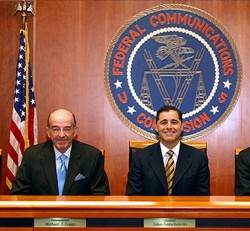FCC Green-Lights Comcast-NBCU Merger
 After months of deliberations, the Federal Communications Commission has given the green light to the merger between Comcast, the nation's larger cable operator, and NBC-Universal, which owns a major movie studio and a variety of TV networks including NBC and a slew of cable channels.
After months of deliberations, the Federal Communications Commission has given the green light to the merger between Comcast, the nation's larger cable operator, and NBC-Universal, which owns a major movie studio and a variety of TV networks including NBC and a slew of cable channels.On the heels of the FCC announcement, the Justice Department announced its own approval of the merger.
However, the approval didn't come without plenty of conditions. And one commissioner, Michael J. Copps (left of chair Julius Genachowski in picture), gave a piece of his mind to the others who voted for approval.
For starters, the new company (let's call it CNBCU for brevity) can't deny programming to rival multichannel video programming distributors (MVPDs) -- that is, other cable, satellite, and telco video providers.
Neither can it deny programming to online video distributors (OVDs). It must offer programming to them at "fair market value and non-discriminatory prices," on the same terms as with an MVPD, even if the OVD has similar arrangements with a rival of CNBCU. The same applies to its online video programming: agreements cannot be made restricting it to other providers. The FCC specifically required that CNBCU "not exercise corporate control over or unreasonably withhold programming from Hulu." And it cannot use its ISP technology to "disadvantage rival online video distribution."
To ensure that consumers can obtain online video, CNBCU must offer "standalone broadband...at reasonable prices and of sufficient bandwidth." As a result, 2.5 million low-income households will be offered high-speed internet service for $10/month as well as a chance to buy various kinds of computer for $150.
Other provisions cover localism, children's programming, programming diversity, and public, educational, and governmental programming. See FCC press release (PDF).
The 4-1 vote came with a vigorous dissent. Michael J. Copps, a Democrat, said the approval "grievously fails the public interest." He added it would be bad for journalism, might jeopardize public television, and doesn't provide sufficient protection for content producers and smaller cable operators. See Copps dissent (PDF).
























































